Brands should no longer strictly aim to top Google SERPs. Your audience is active all over the internet; they shop for products on Amazon, ask ChatGPT for answers to their most pressing questions, and search for videos on YouTube and TikTok. And even though TikTok is currently banned in the U.S., we’re keeping it on our radar in case some does end up acquiring it in the states (but that’s another topic for another day).
In the meantime, our team at Single Grain Marketing is adapting its traditional search engine optimization (SEO) services to search everywhere optimization (SEvO).
“Our mission is to future-proof our clients’ digital presence,” said Eric Siu, CEO of Single Grain. “By embracing Search Everywhere Optimization, a concept coined in our Marketing School Podcast, we’re leading the charge into a new era of search marketing innovation.”
But what is SEvO? And why should your company consider this as heavily as they do traditional SEO?
This article will walk you through everything there is to know about search everywhere optimization and why we think it’s the future of organic digital marketing.
Key Highlights
- Traditional SEO is no longer enough to attract an audience and convert leads. Search everywhere optimization (SEvO) is better tailored for current user demands, specifically how they search for information and consume content.
- Some aspects of SEvO include video and voice search, hashtag optimization, e-commerce SEO, generative AI use, and optimizing for app stores.
- The platforms that marketers should target include Meta, TikTok, LinkedIn, YouTube, Pinterest, ChatGPT, Amazon, and Reddit.
- To measure SEvO success, start by viewing the engagement metrics that each platform offers. Marketers can also track lead quality, conversion rates, customer retention, and engagement rates for AI search results.
- Single Grain Marketing is evolving our SEO services to fit SEvO demands.
- In the future, SEvO will become the standard way to increase organic traffic and engage leads down the sales funnel. More consumers are also using voice and AI search.
TABLE OF CONTENTS:
Why an SEO Strategy Is No Longer Enough
Think back to 10 years ago. What advice did digital marketing experts give you? Invest in SEO to dominate Google search, right?
A lot has changed in 10 years. The introduction of AI, the expansion of social media, and the evolution of industries like SaaS, big data, and IoT have altered how businesses market themselves on the web.
Google has applied these new technologies and trends to its search engines. But at the same time, many businesses are still behind in the SEO world, still using the same outdated tactics and wondering why they’re no longer getting conversions.
SEO is no longer enough, and there are many reasons why:
- Google’s algorithm changes: The introduction of AI-driven search (like Google’s AI Overviews) means fewer organic click-throughs.
- Zero-click searches: More search queries are answered directly on SERPs, and fewer users visit websites.
- Multi-channel search behavior: Consumers don’t just Google; they ask Alexa, search on TikTok, and browse Reddit for answers.
At the same time, SEO isn’t dead–it’s under a transformation period, which leads us to SEvO. SEvO optimizes content beyond Google’s ecosystem, ensuring your brand is visible wherever users search. And this makes search marketing more critical than it ever has been.
The Shift from SEO to SEvO
Google search preferences have been changing over the years. Users are likelier to use voice search assistants, like Siri and Alexa, rather than hop on Google’s website. AI search is also replacing traditional queries since audiences receive an auto-generated response that answers their direct questions.
As a result, traditional SEO is no longer viable. Organizations must meet these new demands to attract and engage their target audience.
Fortunately, Single Grain Marketing has found a solution called search everywhere optimization, a term coined by Siu and Neil Patel in the Marketing School podcast. This strategy expands traditional search engine marketing to accommodate numerous platforms, like YouTube, ChatGPT, Amazon, and TikTok.
Patel explains that optimizing for search everywhere can drive more traffic to your website, improve brand awareness, and generate more revenue.
The Expanding Search Ecosystem
Source: Thoughtworks
Consumers no longer rely solely on traditional search engines like Google or Bing. AI-powered tools have introduced new search behaviors. These platforms developed new algorithms based on technologies like natural language processing (NLP). As a result, brands must change their optimization strategy to accommodate these new search behaviors:
- Voice assistants (Siri, Alexa, Google Assistant)
- Video signals (how TikTok ranks their For You Page videos)
- Hashtags (Instagram, Facebook, and X)
- Demographics and firmographics (used by LinkedIn)
- E-commerce SEO (Amazon, eBay, Etsy, Walmart)
- Video platforms (such as YouTube)
- AI generative search optimization (ChatGPT, Google SGE, Perplexity, Bing Chat)
- App-based search (Spotify, Pinterest, and Reddit)
In addition, each platform has its search algorithms and ranking criteria. Single Grain created a Meta-specific campaign for Schumacher Homes, which increased their branded searches by 25%.
Practical Steps for Businesses to Implement SEvO
Optimizing your strategy for SEvO won’t happen overnight. Most brands must hire staff members with expertise in these apps and invest in platform-specific software to execute their campaigns. However, brands can start their strategy by following these simple steps.
Step 1: Audit your search presence
- Identify where your audience searches (Google, TikTok, Amazon, AI chatbots, etc.).
- Analyze how your brand appears across these platforms.
Step 2: Optimize for non-traditional search engines
- Research ranking factors for YouTube, TikTok, Amazon, and other relevant platforms.
- Tailor content accordingly (e.g., short-form videos for TikTok and long-form guides for AI search).
Step 3: Create multi-format content
- Develop blog posts, videos, infographics, and podcasts to increase search touchpoints.
- Repurpose content for different platforms (e.g., turn a blog into a LinkedIn post and a YouTube video).
Step 4: Leverage AI for content discovery
- Use AI tools to identify trending topics and search behavior shifts.
- Implement structured data to enhance visibility in AI-generated search results.
Step 5: Encourage social sharing
- Foster community-driven content through comments, shares, and discussions.
- Monitor audience behavior across platforms and adjust strategies accordingly.
Step 6: Monitor and adapt continuously
- Track performance across all search-enabled platforms.
- Adapt strategies based on emerging trends and algorithm changes.
Get My Free SEvO Plan
Optimizing Different Platforms for SEvO
While users still find content on YouTube, other popular search engines are on YouTube, Amazon, and TikTok. How can you optimize your strategy for these additional search engines?
Meta
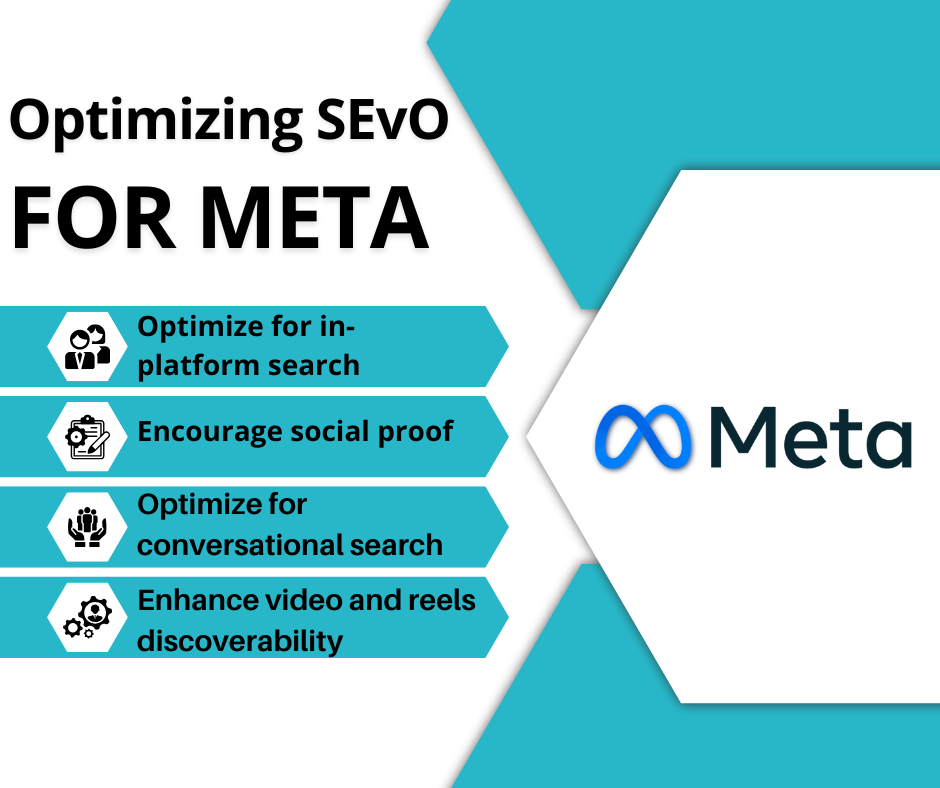
Meta owns numerous companies, such as Facebook, Instagram, and Threads. All these platforms differ in audience demographics, content type, and features. Optimizing these platforms for SEvO requires tailoring content for social search visibility, AI-driven recommendations, and voice-enabled discovery.
First, it’s important to note the difference in demographics. Facebook’s largest audience is Americans in the 25-34 age group. Compare that to Instagram, which is more prevalent among 18+ American female users (specifically Gen Z). Threads is still new but has demographics similar to Facebook.
Even though Meta can apply your SEvO campaign to all these platforms, it’s best to focus on the ones your audience uses.
There are best practices when optimizing your SEvO strategy for Meta products, such as:
Optimize for in-platform search
- Use relevant keywords in posts.
- Optimize hashtags to enhance visibility.
- Leverage alt text on images.
- =Ensure your business details (location, hours, services) are available for local search.
Enhance video and reels discoverability
- Include searchable terms in captions and subtitles.
- Encourage interactions — Meta ranks content based on shares, saves, and comments.
- Tagging locations increases visibility in geo-based search queries.
Optimize for conversational search
- Create FAQ-style content optimized for AI chatbots (Meta AI, Messenger bots).
- Optimize posts to match natural language queries (e.g., “What’s the best café in NYC?”).
- Leverage stories and highlights.
Boost discoverability on Marketplace and Shopping
- Use keyword-rich titles, descriptions, and tags in your products.
- Encourage customer reviews — reviews impact AI-driven product suggestions.
- Use shoppable posts and live shopping to prioritize your content for transactional searches.
Encourage social proof
- Post user-generated content (UGC).
- Facebook Groups rank well in searches—engage in relevant ones.
- Post interactive content like polls.
TikTok
While TikTok’s future is still unclear, this platform still boasts one of the most powerful search engines and algorithms. Optimizing TikTok for SEvO requires a blend of TikTok SEO, AI-friendly content, and engagement-driven strategies to maximize discoverability. TikTok has multiple features, such as TikTok Shop, to boost profitability. Here are some best practices:
Optimize for TikTok’s search algorithm
- Use relevant keywords in video captions, descriptions, and on-screen text.
- Leverage hashtags, including trending, niche, and branded hashtags.
- Add keywords to your profile and bio.
Enhance TikTok Shopping
- Tag products in videos.
- Use clear calls-to-action (CTAs).
- Leverage TikTok LIVE.
Pinterest goes beyond competitors like Instagram with its visual-based platform. This app is a go-to for those looking for lifestyle, home design, fashion, and beauty content, or just general inspiration. Pinterest has since expanded its image-focused content to offer more robust solutions for e-commerce brands. Here are some best practices when optimizing Pinterest for SEvO.
Optimize for Pinterest’s search algorithm
- Pin consistently – The algorithm rewards accounts that pin daily rather than sporadically.
- Use relevant keywords in Pin titles and descriptions.
- Include searchable terms in your username, bio, and board names.
- Add alt text to Pins.
- Use hashtags strategically – Unlike Instagram, Pinterest hashtags work for categorization rather than virality.
Create AI-optimized visual content
- Use vertical, high-resolution images (2:3 Ratio).
- Overlay text with keywords.
- Use video pins – Pinterest prioritizes video content for engagement.
Optimize for Pinterest shopping and e-commerce
- Use Pinterest product pins, which enable direct purchasing from your profile.
- Tag products in Pins.
- Leverage Pinterest ads.
YouTube

Source: YouTube
YouTube is the second-largest search engine in the world and a key player in AI-driven search. Since YouTube videos rank on Google, optimizing your videos for keywords, engagement, and AI-driven recommendations is crucial.
Optimize for YouTube’s search algorithm (YouTube SEO)
- Use long-tail keywords in your titles.
- Upload compelling thumbnails.
- Write keyword-rich descriptions — the first 200 characters matter most!
- Use broad and niche tags for better categorization.
Optimize for YouTube’s recommendation algorithm
- Increase watch time.
- Encourage viewer interactions.
- Create playlists and series.
Leverage YouTube Shorts
- Use hashtags like #shorts.
- Repurpose long-form content into Shorts.
- Post consistently (1-2 Shorts daily).
- Use trending sounds and captions.
App Stores
Apple’s App Store has 1.96 million apps, and the Google Play store has 2.87 million. These app stores attract a significant amount of traffic, and since more companies are creating apps for their customers, optimizing app store SEO can boost downloads and engagement rates.
Optimize for app store search
- Focus on app title optimization.
- Use keywords in your app subtitle and short description.
- Use relevant keywords in the “Keyword Field” (Apple only).
Optimize for AI & voice search
- Use conversational language in app description.
- Enable voice-activated actions and deep linking.
- Include spoken keywords in app promo video content.
Leverage indexing
- Implement Firebase App Indexing (Android).
- Use iOS Core Spotlight API (Apple).
- Create deep links so AI can surface specific app content.
Optimize app icons, screenshots, and videos
- Use a simple and recognizable app icon.
- Show your app’s features in screenshots.
- Use captions in your app preview video.
Encourage ratings and reviews
- Request reviews when engagement is high.
- Respond to user reviews.
- Encouraging feature requests and feedback.
Use paid and organic strategies together
- Run Apple search ads & Google Play ads.
- Leverage influencer & social media SEO.
- Use AI-powered chatbots to promote your ad.
ChatGPT
While new, more marketing teams are optimizing their SEvO strategy for generative engine optimization (GEO). This is optimizing content for generative AI platforms such as ChatGPT. If you’re looking to use GEO and ChatGPT-generated content for SEvO, here are some key strategies to think about:
Use natural language and a conversational tone in your writing
- Full-sentence answers
- Simple, direct language
- A natural, human-like tone
Target long-tail and question-based keywords
- Optimize your content for complete sentences, such as “What are the best coffee shops in New York City?”
- Use question words like who, what, where, when, why, and how.
Provide direct and concise answers first
- First sentence: Direct answer (under 30 words).
- Following sentences: Additional context if needed.
Leverage Featured Snippets Style
- Bullet points.
- Numbered lists.
- Clear, well-structured paragraphs.
Optimize for Local Voice Search
- Include location-based keywords in your content.
- Keeping your Google Business Profile updated.
- Using “near me” search intent phrases.
Improve page load speed and mobile optimization
- Have a mobile-friendly website.
- Use tools like Google PageSpeed Insights to ensure your pages load fast.
Use structured data and schema markup
- Mark up FAQs, business details, and product information
- Use Speakable Schema for voice-friendly content
Amazon
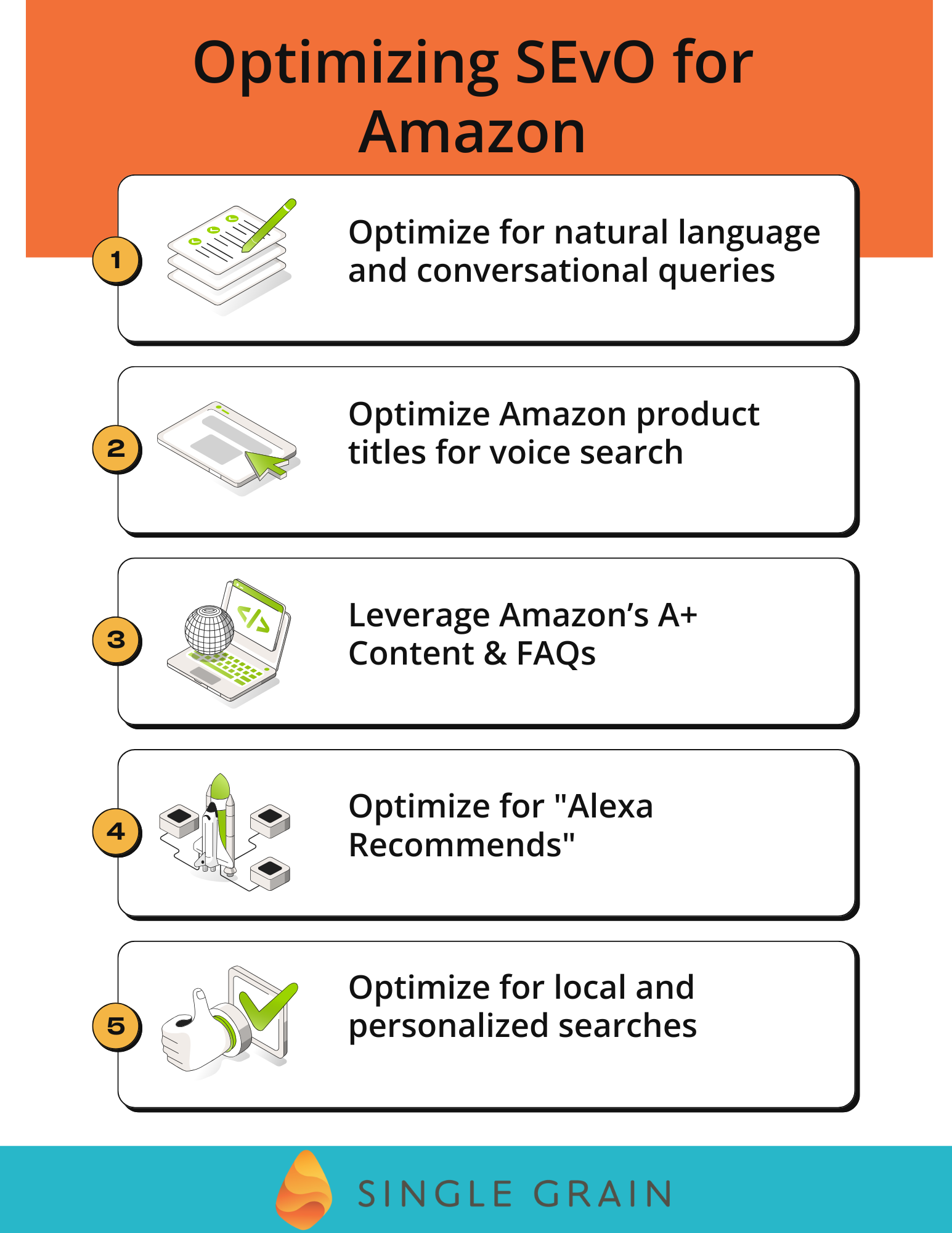
In addition to Google and YouTube, Amazon has one of the most sophisticated algorithms. 56% of buyers begin their product searches on Amazon, and they will also use Amazon to compare prices, find recommendations, and read reviews.
Optimizing your Amazon store for SEvO means making product listings voice-search-friendly so voice assistants like Alexa can easily find and recommend them. Here’s how you can do it:
Optimize for natural language and conversational queries
- Voice searches are longer and more conversational than text searches.
- Use question-based phrases in product descriptions and FAQs.
Optimize Amazon product titles for voice search
- Keep them concise but informative (aim for 60-80 characters).
- Ideal structure: [Brand] + [Key Feature] + [Product Type] + [Use Case]
Use bullet points in your product descriptions
- Write clear, scannable, and voice-friendly content.
- Keep sentences short and direct for better Alexa recognition.
Leverage Amazon’s A+ Content & FAQs
- Use A+ Content to provide clear, structured information.
- Add common customer questions in the FAQ section using natural, voice-searchable phrases.
Optimize for “Alexa Recommends”
- Get more positive reviews (aim for 4+ stars).
- Use high-quality images to boost conversion rates.
- Offer competitive pricing & fast shipping (Prime-eligible products rank better).
Optimize for local and personalized searches
- Many voice searches include “near me” or personalized queries.
- If selling location-relevant products, use terms like “best winter jacket for New York weather.”
LinkedIn is more than just a social network; it’s where professionals can meet connections, market their brand, and find jobs and employees. It also has a powerful search engine where professionals can search for potential partners, industry insights, and vendor recommendations.
Optimizing LinkedIn for SEvO (Search Engine Voice Optimization) ensures your profile, posts, and company page are easily found through search. Here’s how you can optimize LinkedIn effectively.
Optimize your LinkedIn profile for voice search
- Use natural language keywords in your headline and about section.
- Add job titles and specialties that match voice search patterns.
- Write in a conversational tone that sounds natural when read aloud.
Use question-based and conversational keywords
- Use natural, spoken phrases in your headline and about sections.
- Clearly define your role using specific keywords.
- Write posts and articles in a way that directly answers industry-related questions.
Optimize your LinkedIn company page for voice search
- Use natural phrases in your company description (e.g., “We help small businesses grow with AI-powered marketing solutions.”)
- Add FAQs to your page that answer common voice search queries.
- Post industry insights that answer “How-to” or “What is” questions.
Optimize for LinkedIn audio events and podcasts
- Host LinkedIn Audio Events with relevant industry keywords in the title.
- Use a conversational Q&A format to match real-world voice queries.
- Post summaries of your audio content with key takeaways in text form.
Encourage engagement for better SEvO ranking
- Ask questions in your posts to drive engagement.
- Use polls & interactive content that spark discussions.
- Reply with detailed comments that include natural search phrases.
Reddit is a high-authority platform where millions of users search for advice, product recommendations, and industry insights. Google and Reddit have a partnership; since Reddit posts often rank higher than websites on Google, optimizing for Reddit search and external search engines can drive massive visibility. Here’s how to optimize Reddit for SEvO.
Optimize Reddit posts for internal search algorithm
- Use SEO-friendly, question-based titles (e.g., “What are the best marketing tools for startups?”).
- Include keywords in your post and comments.
- Write detailed, valuable answers to get upvotes.
- Post in high-traffic subreddits related to your topic.
Leverage Reddit for backlinks
- Share valuable insights first, then link to a relevant blog or resource.
- Use Reddit-friendly landing pages (not overly promotional).
- Engage in comments & discussions to increase visibility.
- Post in multiple subreddits to increase discovery.
Use Reddit for e-commerce and product discoverability
- Post product comparisons & user-generated content in shopping subreddits.
- Engage in AMAs (Ask Me Anything) related to your industry.
- Share case studies, real-world results, and testimonials.
- Answer Reddit questions related to your product.
Optimize Reddit for voice search
- Structure your answers in Q&A format.
- Include keywords that match common AI-driven queries.
- Keep answers concise and informative to be AI-friendly.
Build Reddit authority
- Contribute valuable comments daily.
- Answer trending questions before they gain traction.
- Avoid overly promotional content—Redditors dislike spam.
Get My Free SEvO Plan
How We’re Adapting to SEvO
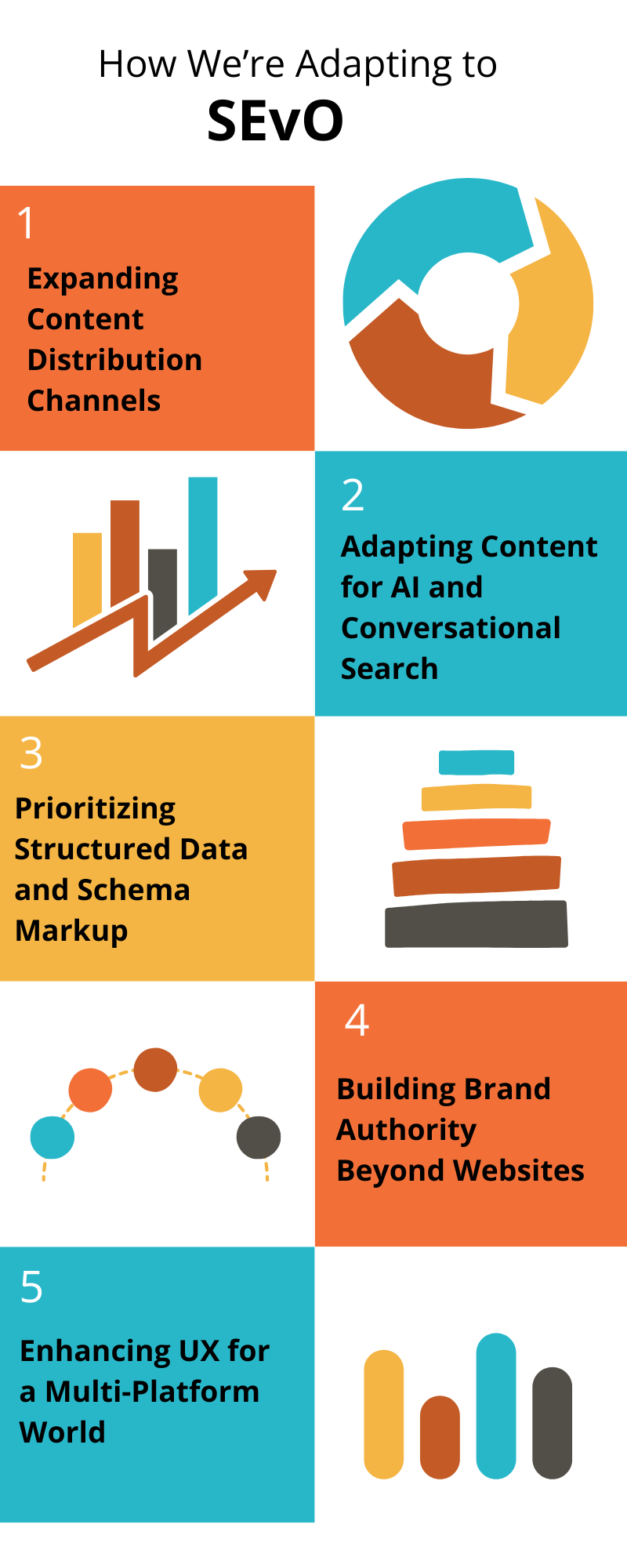
Single Grain Marketing is in the process of redefining our SEO services to fit an SEvO framework. We’re moving beyond traditional search marketing to deliver results across all platforms. What can you expect when working with us on your SEvO campaign?
Expanding Content Distribution Channels
We no longer focus solely on ranking in Google. Instead, we distribute optimized content across multiple search-enabled platforms:
- Video SEO: Optimizing video content with strategic keywords, engaging thumbnails, and metadata optimized for platforms like YouTube.
- Social search optimization: Leveraging trending hashtags, social keywords, and native platform SEO (e.g., LinkedIn optimization).
- Voice search readiness: Structuring content for natural language queries.
- E-commerce SEO: Optimizing product listings with relevant keywords and high-converting descriptions.
Adapting Content for AI and Conversational Search
Generative AI tools like ChatGPT are changing the way users interact with search. To remain relevant, we:
- Create conversational content: Answer common queries in a conversational tone from which AI tools can easily pull.
- Optimize for featured snippets: Structuring content with bullet points, lists, and direct answers to common questions.
- Focus on semantic search: Writing content that aligns with search intent rather than just keywords.
Prioritizing Structured Data and Schema Markup
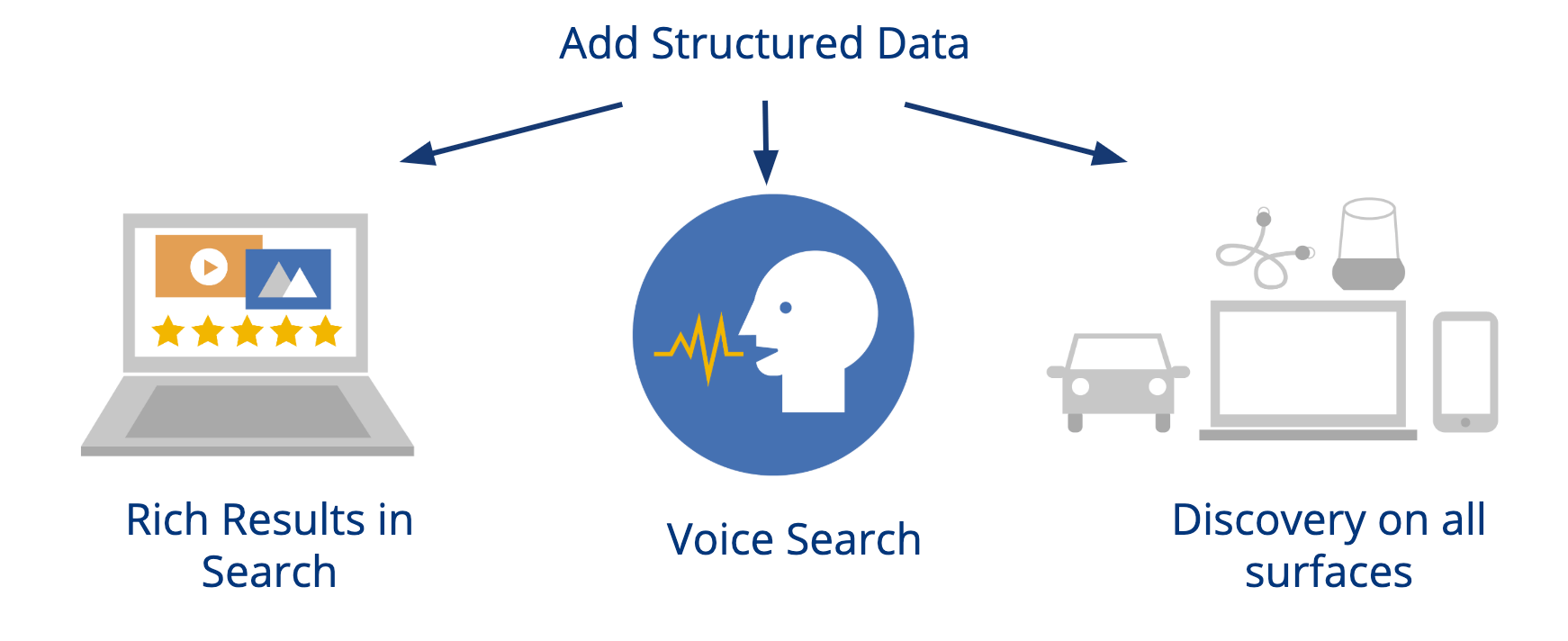
Source: Schema App
Search engines and AI models rely on structured data to understand and display information effectively. We implement:
- Schema markup: Adding structured data to blog posts, product pages, and FAQs to improve visibility in rich results.
- Entity-based optimization: Connecting content to known entities in knowledge graphs to boost contextual relevance.
Building Brand Authority Beyond Websites
Authority isn’t just about backlinks anymore. We strengthen brand visibility by:
- Leveraging social proof: Encouraging user-generated content, reviews, and testimonials on high-visibility platforms.
- Participating in niche communities: Engaging on Reddit, Quora, and industry-specific forums — these are all forms of community marketing.
- Collaborating with influencers: Partnering with creators whose content ranks well in social and video searches.
Enhancing UX for a Multi-Platform World
User experience (UX) is a ranking factor across various search ecosystems. To optimize for SEvO, we:
- Ensure mobile and voice compatibility: Designing content and websites for seamless voice search and mobile browsing.
- Improve page speed and core web vitals: Enhancing website performance for both Google and third-party search engines.
- Optimize for app-based search: Ensuring discoverability on platforms like Pinterest, YouTube, and Spotify.
Measuring SEvO Results
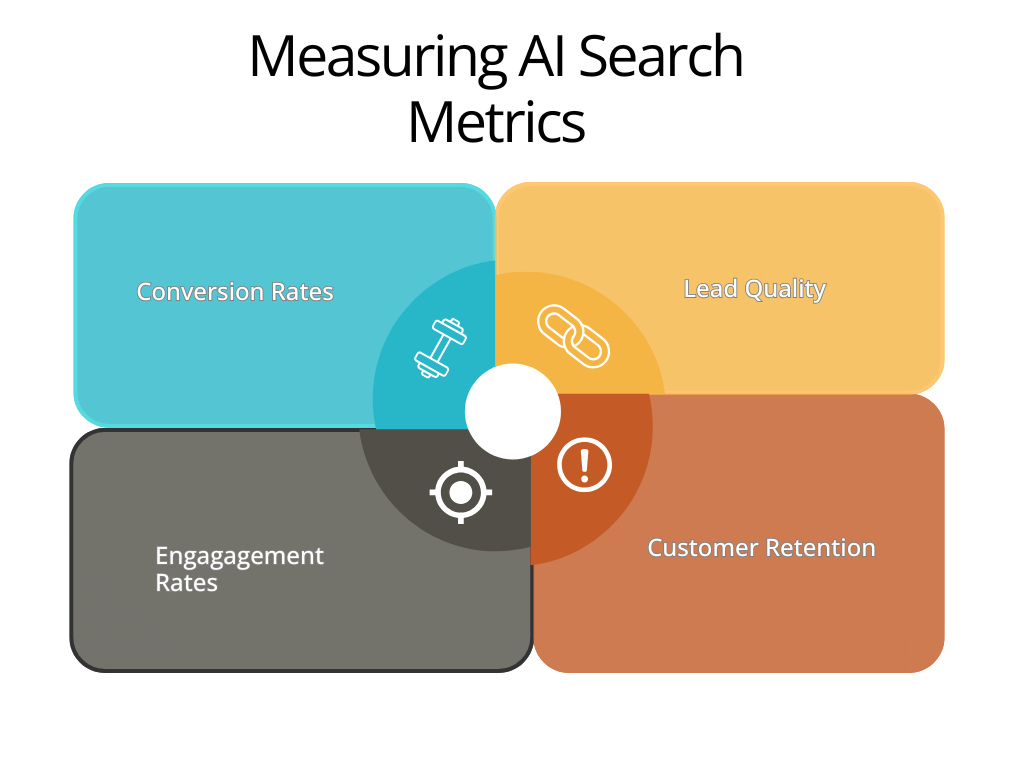
There’s a reason why many brands have been hesitant to adjust to SEvO. If your content ranks in AI Overviews, your audience will be less likely to click on your links. How else can marketers measure campaign success?
One of the benefits of SEvO is that brands don’t need to rely exclusively on website traffic as a success KPI. Many platforms, such as Meta and TikTok, offer engagement metrics. Marketers can measure their success via likes, impressions, shares, profile visits, new followers, and comments.
YouTube also has its success KPIs. Marketers can measure new subscribers, views, and time spent watching a video.
What about content that ranks on AI Overviews and ChatGPT? It’s difficult to know if your content tops AI search, let alone how to measure your performance on these platforms. Your only option is to monitor SERPs and the AI Overviews for your keywords.
What about success KPIs? Monitor lead quality, conversion rates, engagements, and customer retention metrics. While it’s impossible to know if these successes are from AI search results, if you see an increase in any of these metrics while your results are ranking on AI SERPs, there’s a good chance that your AI-optimized content is showing results.
The Future of SEvO: What’s Next?
Audiences have outgrown search engines. This means SEvO is an ongoing evolution rather than a one-time shift. Here’s what we anticipate for the future:
- SEvO will become essential: Businesses must master SEO for TikTok, LinkedIn, and other growing search engines.
- AI-powered search will become the norm: More users will turn to AI-driven search tools, requiring brands to optimize for AI-generated answers.
- Greater integration of voice and visual search: Image-based and voice-driven search and technologies like NLP and optical character recognition (OCR) will play a more significant role in content discovery.
Search Everywhere Optimization Is the Future
With search everywhere optimization, Single Grain Marketing is looking beyond Google for our clients. This strategy will allow us to expand to multiple platforms, ensuring our clients can attract more high-converting leads.
Some of our SEvO tactics include diversifying content, optimizing for AI-driven search, and leveraging multi-channel discovery. These strategies ensure we’re keeping up with modern search preferences while adapting to the future of SEO.
Are you ready to embrace SEvO? Let’s connect!
If you’re ready to level up your search everywhere optimzation strategy, Single Grain’s marketing experts can help!👇
Let’s Do SEvO Right
For more insights and lessons about marketing, check out our Marketing School podcast on YouTube.
Frequently Asked Questions About Search Everywhere Optimization
What is search everywhere optimization?
Search Everywhere Optimization (SEvO) is a strategy that ensures your content, brand, or business is easily discoverable across multiple search platforms—not just traditional search engines like Google. It optimizes content for voice search, social media, e-commerce platforms, AI assistants, and other digital channels where people search for information.
Why should I do SEvO instead of traditional SEO?
Traditional SEO focuses only on Google rankings, which are declining. SEvO addresses the changes in how users search for content while ensuring you have a strong brand presence across multiple search platforms—Google, Amazon, LinkedIn, YouTube, TikTok, AI chatbots, and voice assistants like Alexa and Siri.
Can I do SEvO for free?
Yes! You can optimize for SEvO (for free by focusing on content, keywords, and engagement strategies without using paid tools. There are limitless free SEO tools, and many platforms, like Moz, offer tools without signing up and at no extra cost.
Which are the most critical channels for SEvO?
The most essential channels vary based on your audience and industry, but here are the top SEvO channels you should optimize for:
- ChatGPT
- Voice assistants
- TikTok
- Meta
- YouTube
- Amazon
How are digital marketing companies adapting to the new SEvO demands?
With search behavior shifting beyond Google, digital marketing companies are evolving strategies to meet SEvO demands across multiple platforms. Instead of just focusing on traditional SEO, they optimize for AI-powered search, voice search, social media, video, and e-commerce platforms.
Here are some of the ways that Single Grain Marketing will rank you across all major platforms:
- Optimizing for AI search
- Prioritizing voice search optimization
- Leveraging social media platforms, like LinkedIn and Meta, as search engines.
- Enhancing visibility for e-commerce companies on Amazon and other marketplaces.
If you were unable to find the answer you’ve been looking for, do not hesitate to get in touch and ask us directly.
www.singlegrain.com (Article Sourced Website)
#Adapting #SEO #SEvO #Search #Optimization
